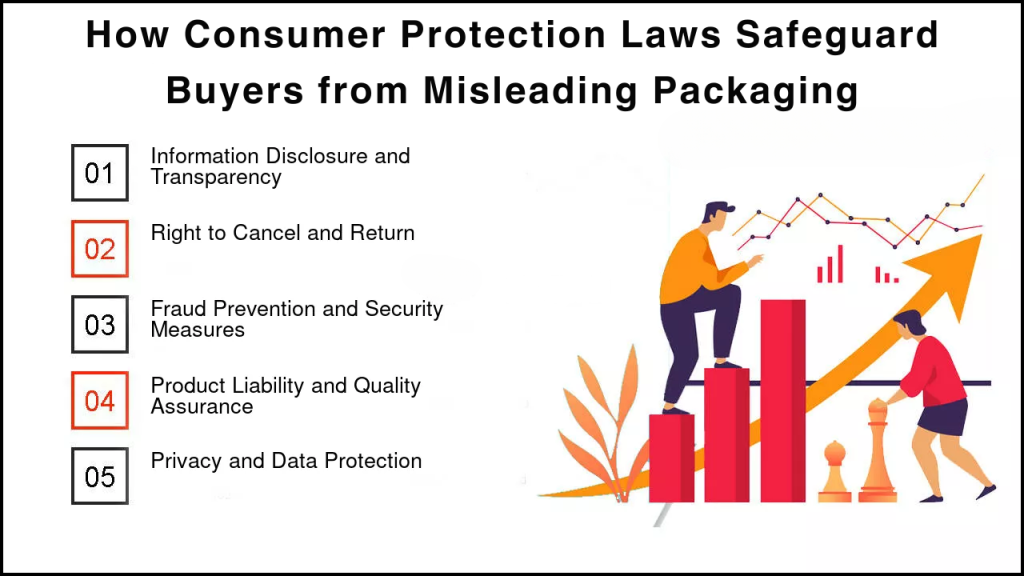
Misleading packaging is a widespread issue that affects consumers who depend on product labels to make well-informed purchasing decisions. Many companies employ eye-catching designs, exaggerated claims, and deceptive branding to attract customers. However, various laws and regulations exist to shield consumers from such unethical practices. These rules ensure that product packaging remains accurate, transparent, and free from false representations.
The Significance of Consumer Protection Laws
Consumer protection laws are essential in preventing businesses from engaging in unfair marketing tactics, including misleading packaging. These regulations compel companies to provide truthful information about their products and establish strict guidelines to deter deceptive practices. Without these safeguards, consumers would be more susceptible to purchasing goods that fail to meet their needs or expectations.
Common Strategies Used in Misleading Packaging
Businesses often use various deceptive packaging techniques to manipulate consumer perception, including:
- False Claims – Some products claim to provide benefits they do not actually offer. For instance, a skincare product may advertise “instant wrinkle removal,” when, in reality, the effect is only temporary.
- Enhanced Images – Many food and cosmetic brands use altered images to make their products look more attractive or larger than they truly are.
- Confusing Labels – Some companies use complicated terminology or misleading descriptions to make their products seem healthier or superior.
- Deceptive Sizing and Quantities – Certain packages appear larger due to excessive empty space, tricking consumers into thinking they are getting more product than they actually are.
- Fake Endorsements and Certifications – Some products falsely claim to be “doctor-recommended” or “scientifically proven” without authentic verification.
Key Regulations That Safeguard Consumers
To combat deceptive packaging, governments and regulatory agencies have implemented strict laws. Some of the key regulations include:
1. Truth in Labeling Laws
Truth in labeling laws require businesses to provide accurate information about their products, including ingredients, nutritional facts, and potential side effects. These laws prevent companies from making misleading claims.
2. Fair Packaging and Labeling Act (FPLA)
The FPLA ensures that all consumer goods display accurate net quantity, product identity, and manufacturer details. This prevents misleading packaging tactics that make a product appear larger than its actual contents.
3. Consumer Protection from Unfair Trading Regulations
These regulations prohibit businesses from engaging in deceptive commercial practices, such as false advertising and misleading packaging. Companies found in violation of these laws may face legal action, including fines and product recalls.
4. Food and Drug Administration (FDA) Guidelines
The FDA enforces strict labeling requirements for food, beverages, cosmetics, and pharmaceuticals. Companies must provide truthful ingredient disclosures, health warnings, and nutritional details to protect consumers.
5. Advertising Standards Authority (ASA) Guidelines
The ASA ensures that all advertising and packaging claims are factual. If a company is caught exaggerating its product benefits, it may face penalties or be required to revise misleading information.
The Role of Consumer Awareness
While laws are essential for preventing misleading packaging, consumer awareness is equally important. Shoppers should educate themselves about their rights and learn to identify deceptive claims. Here are some ways consumers can protect themselves:
- Reading Labels Carefully – Consumers should check ingredient lists, expiration dates, and product descriptions to ensure the product aligns with their expectations.
- Comparing Products – Instead of relying solely on packaging, shoppers should compare similar products to assess differences in quality and quantity.
- Verifying Claims – If a product claims to be “organic” or “scientifically tested,” consumers should look for legitimate certifications.
- Reporting Misleading Packaging – If a product contains false claims, consumers should report it to consumer protection agencies to prevent others from being misled.
- Checking Online Reviews – Customer feedback and online reviews can offer valuable insights into a product’s authenticity and quality.
Responsibilities of Businesses
Companies have both a legal and ethical responsibility to ensure their product packaging is clear and honest. They should:
- Provide truthful and transparent information about their products.
- Avoid misleading marketing techniques that deceive consumers.
- Ensure packaging does not create a false impression about a product’s size or quality.
- Comply with regulatory guidelines to maintain consumer trust and brand credibility.
Consequences of Violating Consumer Protection Laws
Companies that fail to adhere to consumer protection regulations face serious consequences, including:
- Fines and Penalties – Regulatory agencies impose heavy fines on businesses found guilty of misleading packaging practices.
- Product Recalls – Companies may be required to withdraw misleading products from the market, resulting in financial losses.
- Legal Actions – Consumers can take legal action against companies that deceive them, leading to lawsuits and financial liabilities.
- Loss of Consumer Trust – Once exposed for misleading packaging, a brand may struggle to regain consumer confidence and credibility.
The Future of Consumer Protection
With the advancement of technology, regulatory bodies are continuously improving their ability to monitor and prevent misleading packaging. Artificial intelligence (AI) and blockchain technology are being explored to authenticate product claims and verify labeling information. Governments are also strengthening regulations to impose stricter penalties on businesses that engage in deceptive marketing.
Consumer protection laws play an essential role in ensuring that packaging and advertising remain fair and transparent. By staying informed and vigilant, consumers can safeguard themselves from misleading marketing tactics, while ethical businesses can build trust and long-term customer loyalty.













